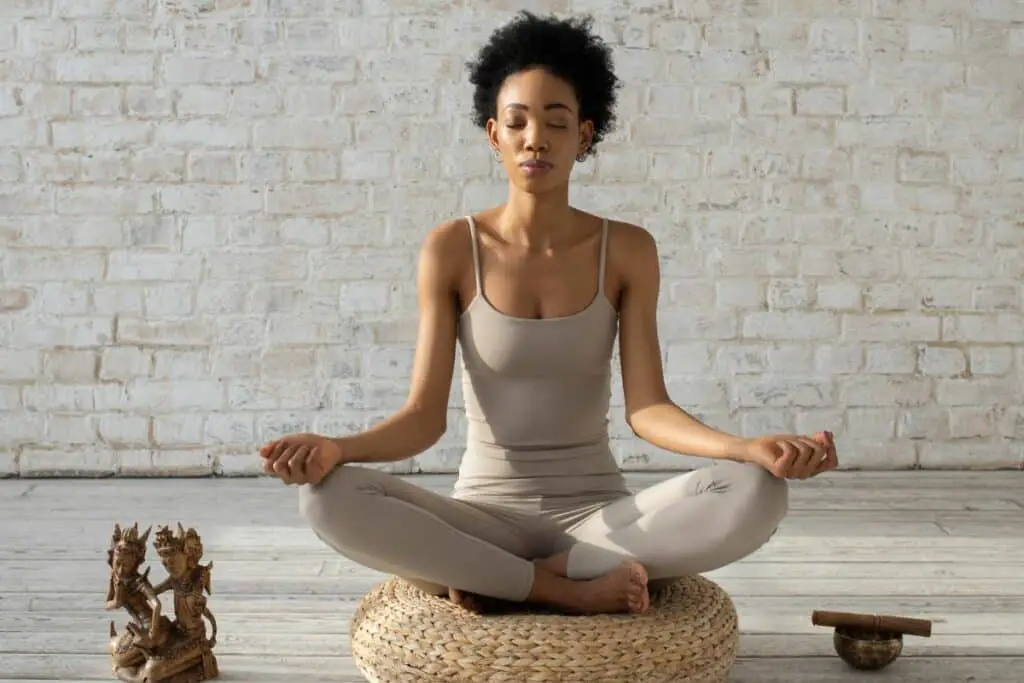The benefits of mindfulness meditation are undeniable. For beginners, mindfulness meditation can be a bit daunting, but with the right guidance and approach, it can be a transformative experience.
Mindfulness meditation has gained popularity in recent years. It involves being present in the moment and paying attention to your thoughts and feelings without judgment. In this article, I’ll discuss some of the most effective steps for mindfulness meditation for beginners.
One of the benefits of mindfulness meditation is that it can help reduce stress and anxiety. By focusing on the present moment, individuals can learn to let go of negative thoughts and emotions that may be causing them stress. Additionally, mindfulness meditation has been shown to improve focus and attention, which can be helpful for those struggling with ADHD or other attention-related disorders.
Getting started with mindfulness meditation can be as simple as finding a quiet place to sit and focusing on the breath. There are also many resources available online, including guided meditations and instructional videos, that can help beginners learn the basics of mindfulness meditation. With practice and patience, anyone can learn to incorporate mindfulness meditation into their daily routine and reap the benefits of this powerful practice.
Read also: Can I Heal Myself? The Truth About the Placebo Effect
Understanding Mindfulness
Mindfulness is a mental state achieved by focusing one’s awareness on the present moment, while calmly acknowledging and accepting one’s feelings, thoughts, and bodily sensations. It is a practice that comes from Buddhist meditation traditions, but it has been adapted and secularized for use in Western contexts.
The goal of mindfulness is to cultivate a sense of inner peace and calmness, which can help individuals better manage their emotions and cope with stress. It involves paying attention to one’s thoughts and feelings without judgment, and observing them from a non-reactive perspective.
Mindfulness can be practiced in many different ways, including meditation, breathing exercises, and body scans. One of the most common forms of mindfulness meditation is breath awareness, where individuals focus their attention on their breath and observe the sensations of breathing.
Research has shown that mindfulness can have many benefits for mental and physical health. It has been found to reduce symptoms of anxiety and depression, improve attention and focus, and even lower blood pressure and improve immune function.
Overall, mindfulness is a powerful tool that can help individuals cultivate greater awareness and presence in their daily lives. By learning to pay attention to the present moment without judgment, individuals can better manage their emotions and improve their overall well-being.
Mindfulness meditation encompasses a variety of practices derived from contemplative traditions and adapted to a secular context. These practices aim to minimize distractions and promote heightened awareness of your mental experiences.
wielgosz et al., 2019
Rather than referring to a single technique, mindfulness meditation represents a diverse range of approaches united by their shared goal of cultivating focused attention and present-moment awareness.

Benefits of Mindfulness Meditation
Mindfulness meditation has been shown to have a wide range of benefits for beginners and experienced meditators alike. Here are some of the most commonly reported benefits:
1. Mindfulness Meditation Reduces Stress and Anxiety
One of the most well-known benefits of mindfulness meditation is its ability to reduce stress and anxiety. By focusing on the present moment and letting go of distracting thoughts, individuals can experience a sense of calm and relaxation. This can help to reduce feelings of stress and anxiety, which can have a positive impact on overall mental health and well-being.
Read more: 16 Proven Tips For Coping With Difficult Situations
2. Mindfulness Meditation Improves Focus and Concentration
Mindfulness meditation can also help to improve focus and concentration. By training the mind to stay present and focused on the task at hand, individuals can improve their ability to concentrate for longer periods of time. This can be particularly beneficial for those who struggle with distractions or have difficulty staying focused at work or in school.
Read also: Quiet the Noise: 50 Daily Affirmations for Focus And Concentration
3. Mindfulness Meditation Improves Sleep
Research has shown that mindfulness meditation can also help to improve sleep quality. By reducing stress and promoting relaxation, individuals may find it easier to fall asleep and stay asleep throughout the night. This can lead to improved overall health and well-being.
Read more: 27 Healthy Habits To Naturally Improve Your Sleep
4. Mindfulness Meditation Increases Self-Awareness
Mindfulness meditation can also help to increase self-awareness. By paying attention to thoughts, feelings, and physical sensations in the present moment, individuals can gain a better understanding of themselves and their experiences. This can lead to increased self-confidence and improved relationships with others.
Read also: 9 Key Steps To Easily Improve Emotional Dysregulation
5. Mindfulness Meditation Improves Emotional Regulation
Finally, mindfulness meditation can help to improve emotional regulation. By becoming more aware of one’s thoughts and feelings, individuals can learn to respond to them in a more constructive and positive way. This can lead to improved emotional well-being and better relationships with others.
Overall, mindfulness meditation can provide a wide range of benefits for beginners and experienced meditators alike. By taking just a few minutes each day to practice mindfulness, individuals can improve their mental and emotional well-being and enjoy a greater sense of overall happiness and fulfillment.
Mindfulness has positive psychological effects, such as increased well-being, decreased psychological symptoms and emotional reactivity, and improved behavioral regulation.
Keng et al., 2011

Preparing for Mindfulness Meditation for Beginners
As a beginner, before diving into mindfulness meditation, it is important to prepare yourself. This involves finding a quiet place, sitting comfortably, and choosing the right time.
(1) Choosing a Quiet Place
To minimize distractions and help you focus, choose a quiet place for your meditation practice. This could be a spare room in your home, a peaceful corner in your garden, or any other location where you feel calm and relaxed. Make sure the space is free of clutter and has good ventilation.
(2) Comfortable Sitting Position
Sitting in a comfortable position is essential for a successful mindfulness meditation practice. Choose a position that allows you to sit upright with your spine straight, but in a relaxed and comfortable way. This could be a cross-legged position on a cushion, a kneeling position, or sitting on a chair with your feet flat on the ground. Experiment with different positions until you find one that feels comfortable for you.
(3) Choosing the Right Time
Choosing the right time for your mindfulness meditation practice is crucial. It is recommended to meditate at the same time each day to establish a routine. Many people find it helpful to meditate first thing in the morning, while others prefer to meditate in the evening to unwind after a busy day. Choose a time that works for you and stick to it as much as possible.
By taking the time to prepare yourself for mindfulness meditation, you can create the optimal conditions for a successful practice. Remember, mindfulness meditation is a journey, and it takes time and practice to reap the benefits.
Read also: 8 Key Tips To Develop A Growth Mindset
In this study, the effects of an 8-week mindfulness training program on mood enhancement were examined, focusing on two specific meditation techniques: focusing attention (FA) meditation and open monitoring (OM) meditation.
Zhang et al., 2019
The results revealed that participants in the meditation training group exhibited significant reductions in anxiety, depression, and rumination scores, indicating an improvement in emotional well-being.
Additionally, their mindfulness scores significantly increased, suggesting an enhanced level of present-moment awareness.
Furthermore, the meditation training group demonstrated reduced reaction times (RTs) in the incongruent condition of the Stroop task, indicating improved cognitive flexibility.

The Process of Mindfulness Meditation for Beginners
Mindfulness meditation is a mental exercise that involves focusing one’s attention on the present moment without judgment. The process of mindfulness meditation can be broken down into three main stages: focusing on breath, observing thoughts, and returning to breath.
1. Focusing on Breath
The first step in mindfulness meditation is to find a quiet place to sit comfortably. The practitioner should then focus their attention on their breath, either by counting their breaths or by simply observing the sensation of the breath moving in and out of their body.
It is important to note that the goal of mindfulness meditation is not to stop thinking or to clear the mind completely. Rather, the goal is to become more aware of one’s thoughts and to observe them without judgment.
2. Observing Thoughts
As the practitioner focuses on their breath, they will inevitably become aware of their thoughts. The second stage of mindfulness meditation involves observing these thoughts without getting caught up in them.
The practitioner should try to maintain a non-judgmental attitude towards their thoughts, simply observing them as they come and go. This can be a challenging aspect of mindfulness meditation, as the mind has a tendency to wander and get caught up in thought patterns.
3. Returning to Breath
The final stage of mindfulness meditation involves returning to the breath whenever the mind wanders. When the practitioner becomes aware that their mind has wandered, they should simply acknowledge the thought and then gently redirect their attention back to the breath.
This process of returning to the breath can be repeated over and over again, as the mind will inevitably continue to wander. The key is to maintain a gentle and non-judgmental attitude towards oneself throughout the process.
Overall, mindfulness meditation is a simple yet powerful tool for cultivating awareness and reducing stress. By following these three stages, practitioners can develop a greater sense of presence and clarity in their daily lives.
Common Challenges in Mindfulness Meditation
Meditation is a powerful tool for cultivating mindfulness, but it can be challenging, especially for beginners. Here are some common challenges that people face when starting a mindfulness meditation practice, along with some tips for overcoming them.
Dealing with Distractions
One of the biggest challenges in mindfulness meditation is dealing with distractions. It’s common for the mind to wander during meditation, especially when you’re first starting out. Thoughts, emotions, and physical sensations can all pull your attention away from your breath or your chosen focus.
To deal with distractions, it’s important to remember that they are a normal part of the meditation process. You don’t need to get rid of them or suppress them. Instead, try to observe them without judgment and then gently bring your attention back to your breath or your focus.
Another helpful technique is to label your distractions. For example, if you notice that your mind is wandering to thoughts about work, you can mentally label it as “thinking” and then bring your attention back to your breath. This can help you detach from your distractions and observe them more objectively.

Overcoming Restlessness
Restlessness is another common challenge in mindfulness meditation. It can manifest as physical discomfort, fidgeting, or a sense of restlessness in the mind. When you’re feeling restless, it can be difficult to sit still and focus on your breath.
To overcome restlessness, it’s important to cultivate a sense of relaxation and ease in your body and mind. You can do this by taking a few deep breaths before you start meditating, relaxing your muscles, and adopting a comfortable seated position.
Another helpful technique is to bring your attention to the physical sensations of restlessness. Notice where you feel it in your body and observe it without judgment. You may find that the restlessness dissipates on its own once you bring your attention to it.
In conclusion, mindfulness meditation can be challenging, but it’s important to remember that these challenges are a normal part of the process. By observing your distractions and restlessness without judgment and cultivating relaxation and ease in your body and mind, you can overcome these challenges and cultivate mindfulness in your daily life.
Tips for Beginners
Starting a mindfulness meditation practice can be challenging, but there are several tips that beginners can follow to make the process easier. Here are a few tips to help beginners get started:
(1) Start Small
One of the most important tips for beginners is to start small. It can be tempting to jump right in and try to meditate for long periods of time, but this can be overwhelming and discouraging. Instead, beginners should start with just a few minutes of meditation each day and gradually increase the amount of time as they become more comfortable with the practice.
(2) Be Consistent
Another important tip for beginners is to be consistent. It’s important to establish a regular meditation practice, even if it’s just for a few minutes each day. This helps to build the habit of meditation and makes it easier to stick with the practice over time.
(3) Practice Patience
Finally, beginners should practice patience. Mindfulness meditation is a skill that takes time and practice to develop. It’s important to be patient with yourself and not get discouraged if you don’t see results right away. Instead, focus on the process of meditation and trust that the benefits will come with time and practice.
Other tips that can be helpful for beginners include finding a quiet and comfortable place to meditate, using a timer to keep track of time, and focusing on the breath during meditation. By following these tips, beginners can establish a solid foundation for their mindfulness meditation practice and begin to experience the many benefits of this powerful practice.
Progressing in Mindfulness Meditation
Once beginners have established a regular mindfulness meditation practice, they may want to explore different techniques to deepen their practice and experience further benefits. Here are some ways to progress in mindfulness meditation:

1. Increase the duration
Beginners may start with short meditation sessions of 5-10 minutes and gradually increase the duration to 20-30 minutes or longer, depending on their comfort level. It is important to find a duration that feels manageable and sustainable, without causing discomfort or strain.
2. Try different techniques
There are many different techniques and approaches to mindfulness meditation, such as body scan, loving-kindness meditation, and walking meditation. Exploring different techniques can help beginners find what works best for them and add variety to their practice.
3. Attend a mindfulness retreat or workshop
Attending a mindfulness retreat or workshop can provide beginners with an immersive and supportive environment to deepen their practice and learn from experienced teachers. It can also be an opportunity to connect with like-minded individuals and develop a sense of community.
4. Incorporate mindfulness into daily life
Mindfulness meditation is just one aspect of mindfulness practice. Beginners can also incorporate mindfulness into their daily life by practicing mindful breathing, mindful eating, and mindful movement. This can help cultivate a more mindful and present way of living.
5. Seek guidance and support
As beginners progress in their mindfulness meditation practice, they may encounter challenges or have questions. Seeking guidance and support from experienced teachers or a community of practitioners can be helpful in navigating these challenges and deepening their practice.
Final words on mindfulness meditation for beginners
Overall, progressing in mindfulness meditation requires patience, dedication, and an open mind. By exploring different techniques, attending retreats or workshops, incorporating mindfulness into daily life, and seeking guidance and support, beginners can continue to deepen their practice and experience the many benefits of mindfulness meditation.
References
Keng SL, Smoski MJ, Robins CJ. Effects of mindfulness on psychological health: a review of empirical studies. Clin Psychol Rev. 2011 Aug;31(6):1041-56.
Wielgosz J, Goldberg SB, Kral TRA, Dunne JD, Davidson RJ. Mindfulness Meditation and Psychopathology. Annu Rev Clin Psychol. 2019 May 7;15:285-316.
Zhang Q, Wang Z, Wang X, Liu L, Zhang J, Zhou R. The Effects of Different Stages of Mindfulness Meditation Training on Emotion Regulation. Front Hum Neurosci. 2019 Jun 27;13:208.









